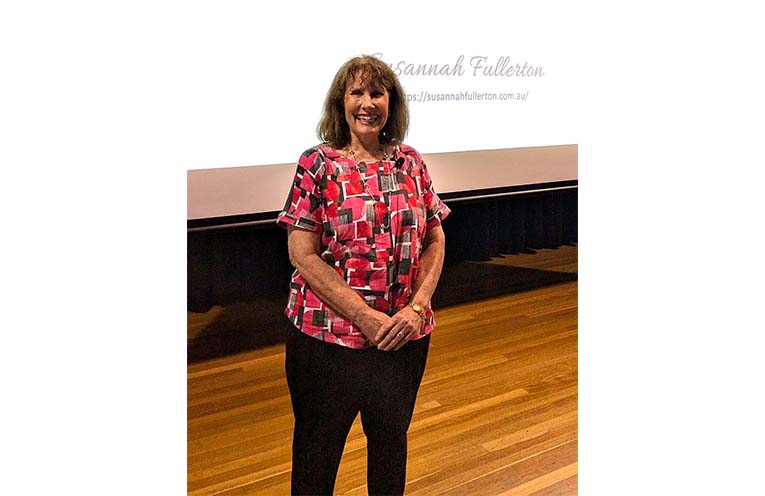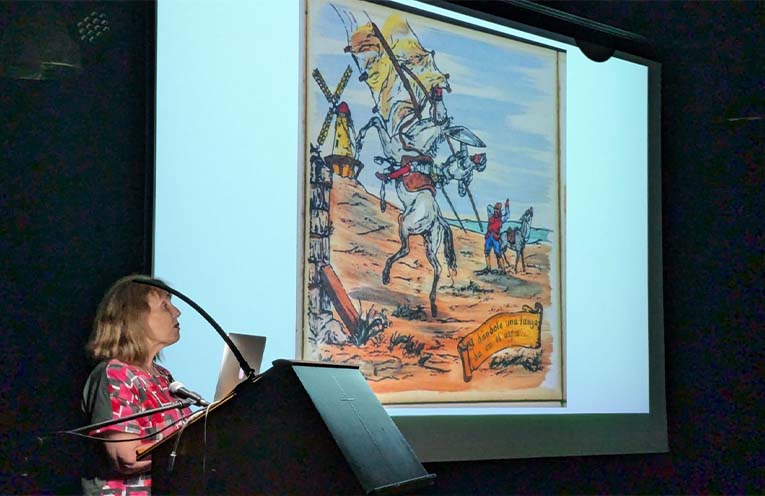
IT was a packed house for ArtsNational Coffs Coast’s final talk for 2024.
Almost 200 people filled the St John Paul College Theatre to hear Susannah Fullerton’s presentation, “Ten Novels That Changed The World”.
 Advertise with News of The Area today.
Advertise with News of The Area today.It’s worth it for your business.
Message us.
Phone us – (02) 4981 8882.
Email us – media@newsofthearea.com.au
Australian President of the Jane Austin Society, author, tour guide and popular presenter, Ms Fullerton surprised and delighted her audience with her selection of novels that have brought about significant change.
Starting with Cervantes’ (1547-1616) idealistic adventurer Don Quixote and his sidekick Sancho Panza, the audience heard how the two-part narrative is now considered the first modern novel, spawning numerous film adaptations, artworks, ballets, operas, Spanish postage stamps, and familiar terms such as “quixotic” and “tilting at windmills”.
“An immediate success, this long-winded novel is now crucial to Hispanic identity and remains the second most translated book after the Bible,” Ms Fullerton said.
Moving in chronological order, the first novel in the English language was Daniel Dafoe’s Robinson Crusoe (1719), which gripped the imagination of people at the time and spawned a sub-genre of “survivalist fiction”, such as Swiss Family Robinson, Lord of the Flies, Gulliver’s Travels, and popular programs like Desert Island Discs.
Waverley, by poet and Scottish nationalist Sir Walter Scott (1771-1832), centres on the 1745 Jacobite Rebellion in Scotland and is now considered the first historical novel.
Balmoral Castle was inspired by the book, along with numerous Australian place names like Waverley, Glen Waverley, Abbotsford and Ivanhoe.
Oliver Twist by Charles Dickens (1812-1870) was initially published in instalments and shed a memorable light on child labour, poverty and violence.
Uncle Tom’s Cabin (1851) by Harriet Beecher Stowe, considered then a searing critique of the slave trade in the American south, is now viewed as a bit stereotyped and not critical enough.
It fuelled the abolitionist movement and was a contemporary bestseller.
The Moonstone (1868) by Wilkie Collins was the first detective novel.
Agatha Christie and Midsummer Murders owe their whodunnit formulas to the ground rules established in this novel.
The sexual controversy following Lady Chatterley’s Lover (1928) by DH Lawrence saw it immediately censored.
A sensational obscenity trial followed (smut vs literary merit), with the first uncensored version of the book only published in 1960.
The Cat in the Hat (1957) by Dr Seuss forever changed children’s literature.
As Ms Fullerton pointed out, children’s literature was exceptionally boring and gender stereotyped before Dr Seuss, with series like Dick and Jane offering a paralysing reading experience.
To Kill a Mockingbird (1960) by Harper Lee and Harry Potter (1997) by JK Rowling are both renowned in terms of influence, sales and film adaptations.
And, as Susannah explained, both are now banned in some American libraries; Harry Potter because of witches and To Kill a Mockingbird because it deals with race and rape.
While Jane Austin is one of Ms Fullerton’s favourite authors, she concluded the talk by saying it wasn’t about personal favourites, but impact over time.
“Fiction is a gateway to empathy, imagination and the power of storytelling,” she concluded.
Audience members were buzzing with questions and alternative top ten choices.
During the post-talk supper, Ms Fullerton was the centre of conversations.
Check out ArtsNational Coffs Coast’s 2025 program at: artsnationalcoffscoast.au.
By Andrea FERRARI
